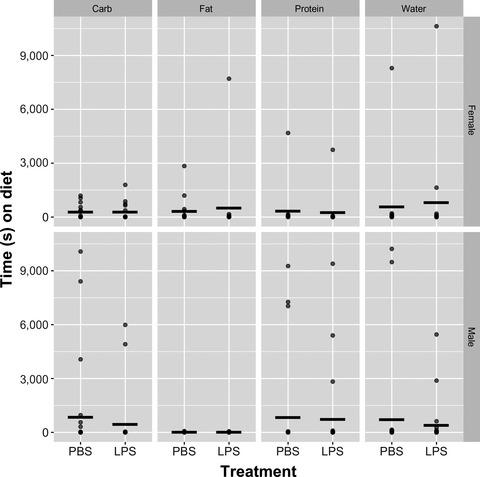当前位置:
X-MOL 学术
›
Ecol. Evol.
›
论文详情
Our official English website, www.x-mol.net, welcomes your feedback! (Note: you will need to create a separate account there.)
No evidence of sickness behavior in immune-challenged field crickets.
Ecology and Evolution ( IF 2.6 ) Pub Date : 2020-06-01 , DOI: 10.1002/ece3.6349 Clint D Kelly 1 , Jules Mc Cabe Leroux 1
Ecology and Evolution ( IF 2.6 ) Pub Date : 2020-06-01 , DOI: 10.1002/ece3.6349 Clint D Kelly 1 , Jules Mc Cabe Leroux 1
Affiliation

|
Sickness behavior is a taxonomically widespread coordinated set of behavioral changes that increases shelter‐seeking while reducing levels of general activity, as well as food (anorexia) and water (adipsia) consumption, when fighting infection by pathogens and disease. The leading hypothesis explaining such sickness‐related shifts in behavior is the energy conservation hypothesis. This hypothesis argues that sick (i.e., immune‐challenged) animals reduce energetic expenditure in order have more energy to fuel an immune response, which in some vertebrates, also includes producing an energetically expensive physiological fever. We experimentally tested the hypothesis that an immune challenge with lipopolysaccharide (LPS) will cause Gryllus firmus field crickets to reduce their activity, increase shelter use and avoid foods that interfere with an immune response (i.e., fat) while preferring a diet that fuels an immune response (i.e., protein). We found little evidence of sickness behavior in Gryllus firmus as immune‐challenged individuals did not reduce their activity or increase their shelter‐seeking. Neither did we observe changes in feeding or drinking behavior nor a preference for protein or avoidance of lipids. Males tended to use shelters less than females but no other behaviors differed between the sexes. The lack of sickness behavior in our study might reflect the fact that invertebrates do not possess energetically expensive physiological fever as part of their immune response. Therefore, there is little reason to conserve energy via reduced activity or increased shelter use when immune‐challenged.
中文翻译:

没有证据表明在免疫挑战性field中有疾病行为。
疾病行为是一组在分类学上广泛协调的行为变化,当与病原体和疾病的感染作斗争时,它增加了寻求庇护的机会,同时降低了一般活动的水平以及食物(厌食症)和水(脂肪)的消耗。解释这种与疾病相关的行为转变的主要假设是能量守恒假设。该假设认为,患病的动物(即受到免疫挑战的动物)减少了精力消耗,以拥有更多的能量来激发免疫反应,在某些脊椎动物中,这还包括产生能量上昂贵的生理热。我们通过实验验证了以下假设,即脂多糖(LPS)的免疫攻击会导致硬毛鹰嘴豆减少的活动,增加庇护所的使用并避免食用会干扰免疫反应(例如脂肪)的食物,同时偏爱刺激免疫反应的饮食(例如蛋白质)。我们几乎没有发现结实的灰鼠疾病行为的证据因为受到免疫挑战的人并没有减少他们的活动或增加他们寻求庇护的机会。我们既未观察到喂养或饮水行为的变化,也未观察到对蛋白质的偏好或避免脂质。男性倾向于使用庇护所的人数少于女性,但性别之间没有其他差异。在我们的研究中,疾病行为的缺乏可能反映了一个事实,即无脊椎动物不具有能量消耗高的生理发烧作为其免疫反应的一部分。因此,在受到免疫挑战时,几乎没有理由通过减少活动或增加避难所的使用来节省能量。
更新日期:2020-06-26
中文翻译:

没有证据表明在免疫挑战性field中有疾病行为。
疾病行为是一组在分类学上广泛协调的行为变化,当与病原体和疾病的感染作斗争时,它增加了寻求庇护的机会,同时降低了一般活动的水平以及食物(厌食症)和水(脂肪)的消耗。解释这种与疾病相关的行为转变的主要假设是能量守恒假设。该假设认为,患病的动物(即受到免疫挑战的动物)减少了精力消耗,以拥有更多的能量来激发免疫反应,在某些脊椎动物中,这还包括产生能量上昂贵的生理热。我们通过实验验证了以下假设,即脂多糖(LPS)的免疫攻击会导致硬毛鹰嘴豆减少的活动,增加庇护所的使用并避免食用会干扰免疫反应(例如脂肪)的食物,同时偏爱刺激免疫反应的饮食(例如蛋白质)。我们几乎没有发现结实的灰鼠疾病行为的证据因为受到免疫挑战的人并没有减少他们的活动或增加他们寻求庇护的机会。我们既未观察到喂养或饮水行为的变化,也未观察到对蛋白质的偏好或避免脂质。男性倾向于使用庇护所的人数少于女性,但性别之间没有其他差异。在我们的研究中,疾病行为的缺乏可能反映了一个事实,即无脊椎动物不具有能量消耗高的生理发烧作为其免疫反应的一部分。因此,在受到免疫挑战时,几乎没有理由通过减少活动或增加避难所的使用来节省能量。


























 京公网安备 11010802027423号
京公网安备 11010802027423号